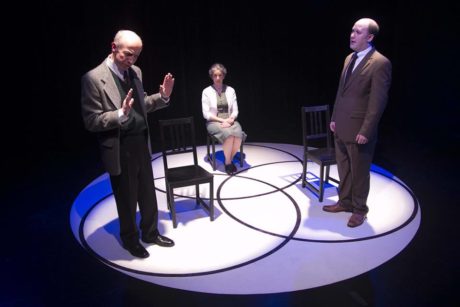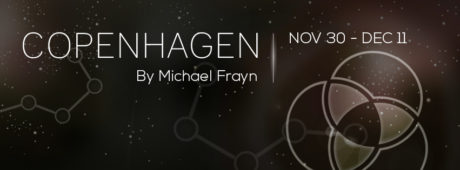The storytelling in Michael Frayn’s Copenhagen—which won the 2000 Tony Award for Best Play—is ingeniously done. The play’s three characters are deceased. They are actual historical figures whom Frayn extensively researched then imagined conversing in an afterlife on a circular stage space that has no specific time but three actual chairs. They speak sometimes to one another and sometimes to us the audience and sometimes as if to some indeterminate cosmos. Frayn’s exquisitely literate script is all talk but it’s riveting talk. And it interweaves exposition, dialogue, and interior monologues in a precise and coherent but not-quite-linear technique that so far as I know is unique to this play.

As I watched Perisphere Theater’s taut and mesmerizing production just opened at Logan Fringe Art Space, I experienced the play’s story and language playing in my mind with exactly the fascination I recall when I watched the Broadway production (which I did perched in onstage seating that surrounded the circular set). Director Heather Benjamin, the cast, and the design team have executed this singular play’s intentions and tensions with spellbinding skill.
The play purports to be about a mystery, a question mark of history that hovers over a particular meeting in 1941 in Copenhagen that occurred when the Danish Nobel-winning physicist Niels Bohr and Margrethe Bohr, his wife and confidant, were visited by the German Nobel-winning physicist Werner Heisenberg. The very first lines of the play establish both the mystery that Frayn will unravel and the method of afterlife memory he will use to do so:
Margrethe: But why?
Bohr: You’re still thinking about it?
Margrethe: Why did he come to Copenhagen?
Bohr: Does it matter, my love, now we’re all three of us dead and gone?
Margrethe: Some questions remain long after their owners have died. Lingering like ghosts. Looking for the answers they never found in life.
Bohr Some questions have no answers to find.
Margrethe: Why did he come? What was he trying to tell you?
As the story unfolds, we learn that Copenhagen is German-occupied, Bohrs is Jewish, and Heisenberg now heads a German physics project that could be devising a nuclear bomb. We also learn that they first met in Denmark when Heisenberg was 22 and Bohrs was 38, they became mentor and mentee (more like father and son), as theoretical physicists they were colleagues and collaborators, and all three remained friends—until the Nazis came to power and war broke out.
So there was a lot at stake in that mysterious 1941 meeting that Frayn now has their memories try to recover. As it turns out, there was more than any of them knew.
What makes Copenhagen absorbing as a work of dramatic literature is that in performance it steadily keeps raising the ante about what is at stake. Because the play proceeds to a big reveal—a cognitive point when we realize that what is at stake is more than a personal visit but rather a critical nuclear juncture in the geopolitical history of the world—the direction and acting need to sync like theatrical fission. And this they do in Perisphere’s production. John Decker as Niels Bohr, Ben McRoe as Werner Heisenberg, and Sue Struve as Margrethe Bohr play like charged particles on an underlying wavelength, like a gravitational forcefield for the mind.
And another thing. This play performed right now, in post-election America—with all the text’s historical references to tyrannical power, racist nationalism, and capacity for nuclear annihilation—takes on a real-world portent that’s like a bomb set to go off.
Running Time: Two hours, including one 15-minute intermission.
Copenhagen plays through December 11, 2016, at Perisphere Theater performing at Logan Fringe Arts Space – 1358 Florida Avenue, NE, in Washington, DC. Tickets can be purchased online.
LINKS:
Review #1:’Copenhagen’ at Perisphere Theater by John Stoltenberg.
Review #2: ‘Copenhagen’ at Perisphere Theater by Jane Franklin.
RATING:





